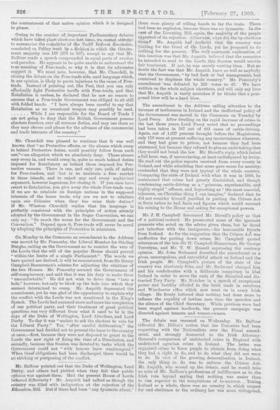On Monday in the Commons an amendment to the Address
was moved by Ponsonby, the Liberal Member for Stirling Burghs, calling on the Government so to restrict the veto of the Lords that the will of the popular House should prevail "within the limits of a single Parliament." The words we have quoted are derived, it will be remembered, from Sir Henry Campbell-Bannerman's scheme for .adjusting the relations of the two Houses. Mr. Ponsonby accused the Government of self-complacency, and said that it was his duty to make them "uncomfortable." He did not wish to drive them "into a hole," however, but only to block up the hole into which they seemed determined to creep. Mr. Asquith deprecated the amendment, yet he was glad of the opportunity to explain why the conflict with the Lords was not mentioned in the King's Speech. The Lords had assumed more and more the complexion of one political party, and their treatment of great political questions was very different from what it used to be in the daYs of the Duke of Wellington, Lord Aberdeen, and Lord Derby. To-day it was "useless to ask the electors to vote for the Liberal Party." Yet, "after careful deliberation," the Government had decided not to present the issue to the country at once,—first, because they were not disposed to grant to the Lords the new right of fixing the time of a Dissolution, and secondly, because this Session was devoted to tasks which the Government could not "with honour leave unattempted." Wheir these obligations had been discharged, there would be no shirking or postponing of the conflict.






































 Previous page
Previous page